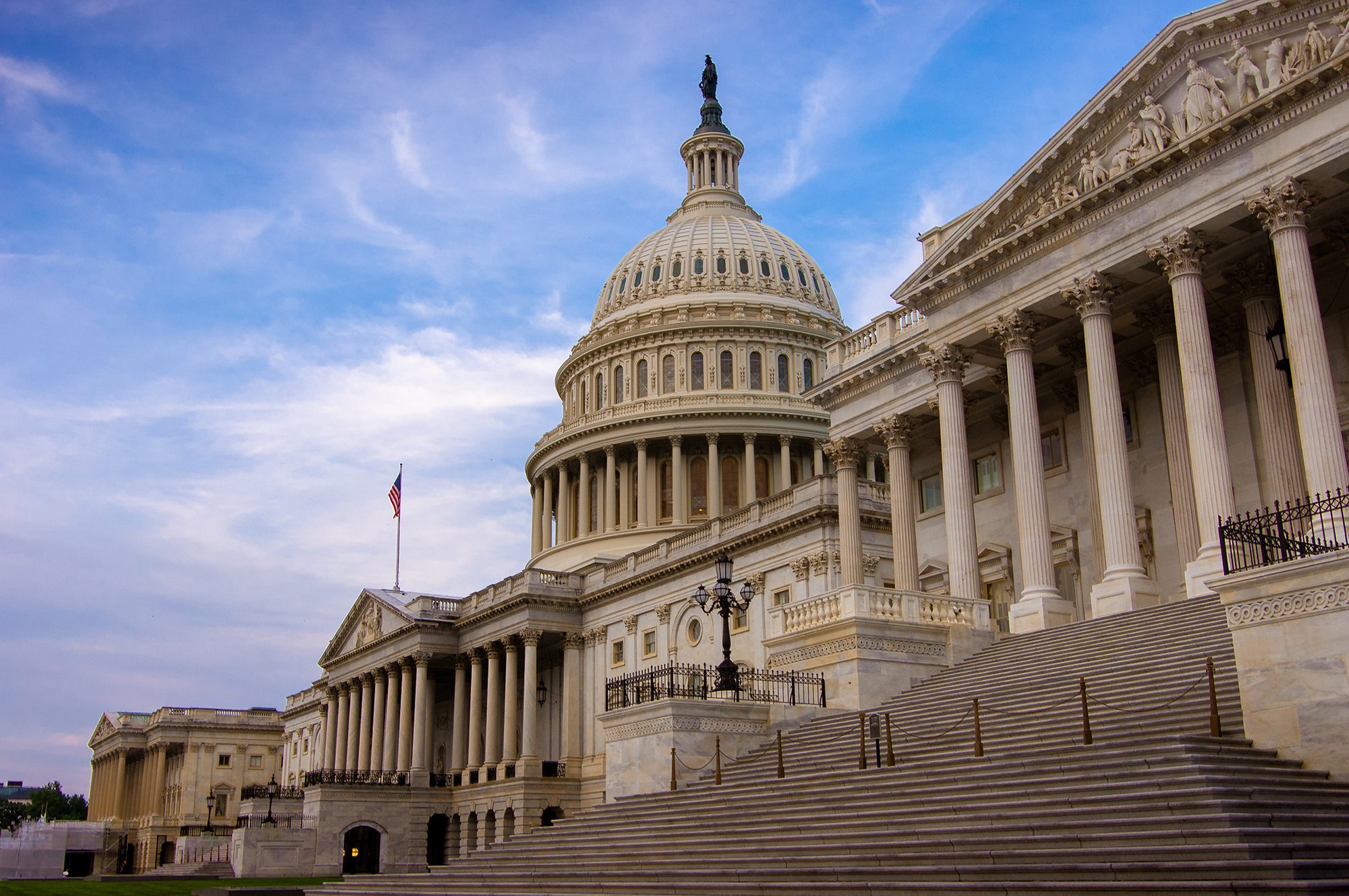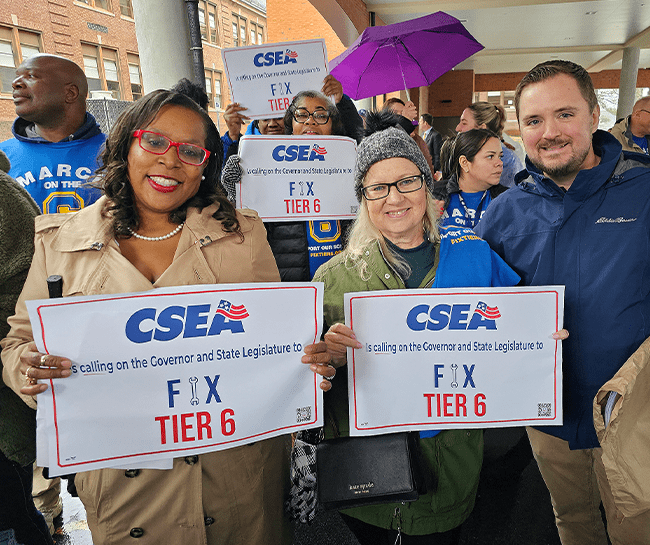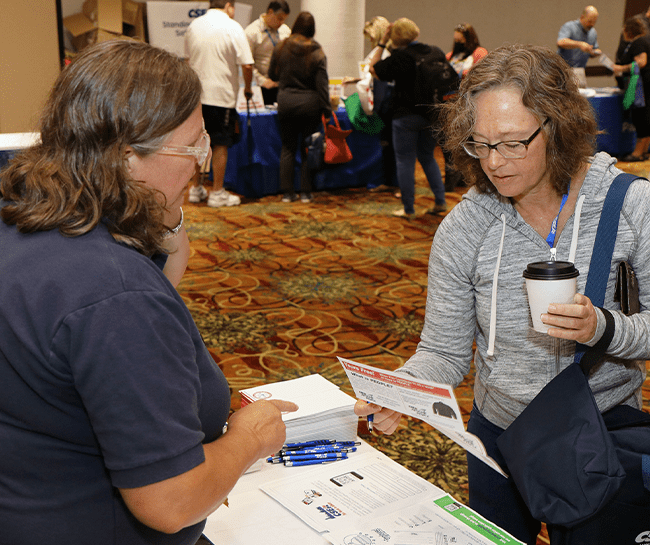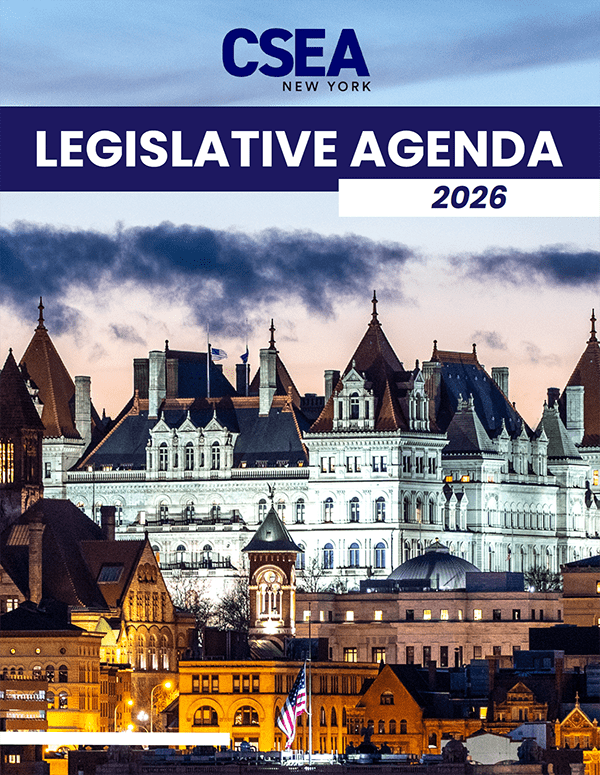Legislative & political action
CSEA’s Legislative & Political Action Department analyzes proposed legislation for its impact on members, advocates for beneficial laws, opposes harmful ones, and partners with members and activists to support the campaigns of elected officials who share our values.


Federal Action Center
On July 4, 2025, President Trump signed the Federal Reconciliation Bill (H.R. 1) into law, ushering in sweeping changes to federal spending that will hit New York especially hard. The law slashes billions in federal aid, shifting costs onto the state and local governments, and threatens essential services that working families rely on. With $10 billion in cuts and cost shifts to the state budget, $13 billion in health care reductions—including deep cuts to safety-net hospitals—and the loss of SNAP benefits for 300,000 New Yorkers, the fallout will be felt in every community. Public services, jobs, and the health and well-being of millions of New Yorkers are now at risk.
Helpful materials


In our fight against these cuts, we are providing members with flyers, including FAQs, fact sheets, and more. Use the links below, but if you are interested in learning more or having a presentation with your members, contact your Political Action Coordinator.
Advocating in New York State
Legislative Action Center
Each legislative session, our union reviews more than 20,000 bills introduced in the New York State Legislature. Over 40% of which directly affect the jobs and lives of CSEA members. Thanks to the activism of union members, we’ve achieved key legislative successes. Read below to learn more about those victories and the issues we’re continuing to fight for to improve members’ lives.

CSEA’s Legislative Agenda 2026
Read “CSEA Legislative Agenda 2026,” a publication that details our union’s legislative priorities this year. Click on the image to read “CSEA Legislative Agenda 2026” online!
This Year in Albany
Read “This Year in Albany,” a publication that details our union’s 2025 legislative successes that will make a positive impact on CSEA members and the communities in which we live and work. Click on the image to read “This Year in Albany” online!
OUR UNION’S SUCCESSES
The following successes are due to the activism of CSEA members.
This session delivered several important victories for CSEA. We led the charge to regulate how artificial intelligence (AI) is used by local governments, school districts, community colleges, and SUNY, ensuring workers aren’t replaced by these new technologies. We were also successful in getting bills done to improve recruitment and retention in the public sector, improve conditions for home-based child care providers and much more.
- Legislative Victories: Local Governments
- Legislative Victories: Civil Service
- Legislative Victories: Health care
- Legislative Victories: K-12
- Legislative Victories: SUNY
- Legislative Victories: OMH & OPWDD
- Legislative Victories: Child care
- Legislative Victories: Work Zone Speed Cameras
- Legislative Victories: DMNA Firefighters 25-Year Retirement
CSEA is celebrating the inclusion of reforms to the Tier 6 pension plan in the FY 2025 State Budget.
The enacted state budget includes a change to how pensions are calculated. Under the new law, a Tier 6 employee’s pension will be based on their top three years of earnings instead of five years. This change will increase retirement security for Tier 6 employees and make Tier 6 look more like earlier pension tiers.
The 2024 New York State legislative session was a successful one for CSEA. In addition to achieving a significant reform to Tier 6 and new investments in the state and local government workforce in the FY2025 state budget, we also achieved several legislative successes prior to the Senate and Assembly’s adjournment for the year.
WHAT CSEA IS WORKING ON
See our union’s 2026 legislative agenda
Gov. Kathy Hochul has proposed a $260 billion State Budget for fiscal year 2027. Her budget is focused on affordability, with proposals to provide universal childcare, reduce utility rates, cut the cost of auto and home insurance, as well as build affordable housing. This budget contains no layoffs, facility closures, or service cuts.
Please review our Summary of the New York State Budget Proposal Fiscal Year 2027.
During this year’s legislative session, fixing Tier 5 and 6 is CSEA’s top priority. These tiers changed the rules on retirement, forcing members to work longer and pay more for smaller benefits, making it harder for public service jobs to compete with the private sector. CSEA is pushing for real pension reforms that put more money back in members’ pockets at retirement by reducing the contribution rate to 3%.
To learn more, visit the Fix Tier 6 page. Help us secure the retirement our Tier 5 and 6 members deserve — join the fight!
Fair Retirement for Court Officers
A bill has passed both houses of the legislature to allow court officers and peace officers employed by the Unified Court System to retire at age 55 with 30 years of service. This legislation takes a big step towards pension parity for these law enforcement personnel. Improving the pension will help the Unified Court System recruit and retain sufficient staff to keep facilities safe and secure.
Write a letter to Governor Hochul urging her to sign this bill!
This bill has passed both houses of the legislature to align supervision requirements for CSEA’s home-based child care providers with what is required in child care centers.
Right now, home-based child care providers must have one caregiver for every two children under 24 months old. However, child care centers are only required to follow this ratio for children under 18 months. This bill which would fix this by aligning the standard of supervision for children under 18 months. This simple change will create more child care slots, which will support home-based child care providers and increase access to affordable infant care for New York families.

This Week in Albany
This Week in Albany is CSEA’s weekly political action newsletter intended to keep members updated on recent developments in politics and legislature.
PEOPLE: Public Employees Organized to Promote Legislative Equality
PEOPLE
Learn about PEOPLE, a voluntary CSEA and AFSCME program where participating members contribute funds which are then used to advance CSEA’s agenda.

Election information

CSEA Election Day Report 2025
While not a sweeping wave, elections across the country showed national politics and policy influencing local outcomes, including in New York State. Nationally, Democrats notched several high-profile wins, including Mikie Sherrill (D) in New Jersey’s gubernatorial race, Abigail Spanberger (D) in Virginia’s gubernatorial race, and California voters’ approval of a redistricting ballot measure that could yield up to five additional Democratic congressional seats. In New York City, Zohran Mamdani defeated former Governor Andrew Cuomo, who ran as an independent, in the mayoral race (CSEA did not make an endorsement.)
Across New York State, CSEA-endorsed candidates performed well, with several notable victories:
Nassau County
- Countywide: Endorsed incumbent Elaine Phillips was reelected Nassau County Comptroller. Endorsed candidate Nicole Aloise was defeated by incumbent Anne Donnelly for District Attorney.
- Legislature: All CSEA-endorsed Nassau County Legislature candidates won.
- Municipalities: All CSEA-endorsed candidates in the City of Long Beach, Town of Hempstead, Town of North Hempstead, Town of Oyster Bay, and City of Glen Cove were successful. One Glen Cove Council race remains too close to call.
Suffolk County
- Legislature: Of nine endorsements, seven CSEA-endorsed candidates were successful.
- Towns: Ed Smyth won reelection as Town of Huntington Supervisor. The Riverhead Town Supervisor race remains too close to call.
- Brookhaven and Babylon: All CSEA-endorsed candidates won.
- Southold: Mixed results; three of six CSEA-endorsed candidates won.
CSEA-endorsed candidates Brad Hoylman-Sigal and Harvey Epstein won election as Manhattan Borough President and to the New York City Council, respectively.
CSEA-endorsed incumbents Ken Jenkins, Ed Day, and Steve Neuhaus were reelected County Executive in Westchester, Rockland, and Orange, respectively.
- Dutchess County Legislature: All CSEA-endorsed candidates won.
- Orange County Legislature: 12 of 14 CSEA-endorsed candidates won.
- Ulster County Legislature: 10 of 12 CSEA-endorsed candidates won.
- Westchester County Legislature: Democrats retained a 15–1–1 majority.
- Priority race: In the Special Election for Assembly District 115, CSEA-endorsed Michael Cashman defeated Brent Davison.
- City of Albany: CSEA proudly endorsed Dorcey Applyrs, who won a historic victory for Mayor.
- Town supervisors: Three CSEA-endorsed candidates won in Niskayuna, Rotterdam, and Glenville.
- Clinton County: Strong performance by CSEA-endorsed candidates; Brandi Lloyd won County Clerk, and all endorsed county legislature candidates prevailed.
Onondaga County
- Onondaga County Legislature: Democrats won a majority for the first time in 50 years, flipping from a 5–12 minority to a 10–7 majority—creating a meaningful check on the county executive.
- Town of DeWitt: CSEA-endorsed Max Ruckdeschel won Town Supervisor.
- Cicero & Camillus: CSEA-endorsed Rob Santucci (Cicero Town Supervisor) and Ken Stoneburg (Camillus Highway Superintendent) flipped seats.
- City of Syracuse: CSEA-endorsed Sharon Owens won decisively for Mayor.
Broome County:
- Binghamton: Incumbent Mayor Jared Kraham was reelected in a close race.
- County Clerk: CSEA-endorsed Aaron Martin won.
Oswego County:
- County Legislature: Two of four CSEA-endorsed candidates won—Ryan Taylor (25th District) and Gena Bartlett (24th District).
Cayuga County:
- Special Election, 10th Legislative District: CSEA-endorsed Amy Sargent won.
- Auburn City Council: Two CSEA endorsements; races remain too close to call.
- County Clerk: Former CSEA member Kristine Lytle won unopposed.
Oneida County:
- County Legislature: All CSEA-endorsed candidates won, including CSEA retiree Cynthia Rogers Witt.
- City of Utica: CSEA-endorsed Comptroller Frank Meola won a close race.
- City of Rome: CSEA-endorsed incumbent councilors successfully held three seats.
Monroe County:
- Greece: CSEA-endorsed Jeff McCann (former Deputy County Executive to Monroe County Executive Adam Bello) won Town Supervisor. Amorette Miller won the Ward 3 Council seat. Marv Stepherson leads by 11 votes; the race heads to a recount.
- Monroe County Legislature: CSEA member Leslie Schildt was not successful.
Erie County:
- Buffalo: State Senator Sean Ryan won the mayor’s race, triggering a special election for his Senate seat early next year.
- County Comptroller: Kevin Hardwick won reelection.
- Erie County Legislature: CSEA-endorsed candidates swept all endorsed races.
- Towns:
- Amherst: Clean sweep—Shawn Lavin elected Supervisor; both endorsed council candidates won.
- Hamburg: Endorsed slate leads narrowly—Beth Farrell (R) leads for Supervisor by 111 votes; Lynn Dixon won a council seat; Nick Ortiz leads by 291 votes for the second seat. Close races will go to recounts.
Niagara County:
- County Legislature: CSEA-endorsed candidates swept their races.
- Lockport: CSEA-endorsed Alderman Rowland O’Malley leads by six votes.
Chautauqua County:
- County Executive: Incumbent P.J. Wendel was reelected.
- County Clerk: CSEA-endorsed Greg Carlson won.
- Legislature: CSEA endorsed candidates Fred Larson and Tom Nelson successfully retained their seats.
CSEA LOCAL GOVERNMENT ENDORSEMENTS
Nassau County
City of Long Beach:
City of Long Beach Council: Michael Reinhart
City of Long Beach Council: Tracey Johnson
City of Long Beach Council: George Ennis
Town of Hempstead:
Hempstead Town Supervisor: John Ferretti
Hempstead Town Clerk: Kate Murray
Hempstead Town Council, 1st District: Dorothy Goosby
Hempstead Town Council, 4th District: Laura Ryder
Hempstead Town Council, 6th District: Dennis Dunne, Sr.
Town of North Hempstead:
North Hempstead Town Supervisor: Jennifer DeSena
North Hempstead Town Clerk: Ragini Srivastava
North Hempstead Town Council, 1st District: John DiFrisco
North Hempstead Town Council, 3rd District: Dennis Walsh
North Hempstead Town Council, 5th District: Yaron Levy
Town of Oyster Bay:
Oyster Bay Town Supervisor: Joseph Saladino
Oyster Bay Town Clerk: Richard LaMarca
Oyster Bay Town Council: Thomas Hand
Oyster Bay Town Council: Louis Imbroto
Oyster Bay Town Council: Andrew Monteleone
Nassau County:
Nassau County Comptroller: Elaine Phillips
Nassau County District Attorney: Nicole Aloise
Nassau County Legislative District 2: Viviana Russell
Nassau County Legislative District 5: Olena Nicks
Nassau County Legislative District 14: Cynthia Nunez
City of Glen Cove:
City of Glen Cove Mayor: Pamela Panzenbeck
City of Glen Cove Council: Kevin Maccarone
City of Glen Cove Council: Grady Farnan
City of Glen Cove Council: Ellen Pantazakos
City of Glen Cove Council: Michael Ktistakis
City of Glen Cove Council: Danielle Fugazy
City of Glen Cove Council: John Zozzaro
Suffolk County
Town of Babylon:
Town of Babylon Supervisor: Richard Schaefer
Town of Babylon Clerk: Gerry Campitello
Town of Babylon Council: Antonio Martinez
Town of Babylon Council: Anthony Manetta
Town of Huntington:
Town of Huntington Supervisor: Ed Smyth
Town of Huntington Council: Dave Bennardo
Town of Brookhaven:
Town of Brookhaven Clerk: Kevin LaValle
Town of Southold:
Town of Southold Clerk: Denis Noncarrow
Town of Southold Tax Assessor: Dana Forlenza
Town of Southold Council: Nicholas Planamento
Town of Southhold Highway Superintendent: Greg Schlachter
Town of Southold Trustee: Liz Gillooly
Town of Southold Trustee: Joe Finora
Suffolk County:
Suffolk County Legislative District 1: Gregory Doroski
Suffolk County Legislative District 2: Ann Welker
Suffolk County Legislative District 4: Steve Englebright
Suffolk County Legislative District 8: Kelly Perry-Hyland
Suffolk County Legislative District 9: Samuel Gonzalez
Suffolk County Legislative District 13: Salvatore Formica
Suffolk County Legislative District 15: Jason Richberg
Suffolk County Legislative District 16: Rebecca Sanin
Suffolk County Legislative District 18: Craig Hershkowitz
New York City Comptroller: Mark Levine
Manhattan Borough President: Brad Hoylman-Sigal
New York City Council District 2: Harvey Epstein
New York City Council District 8: Elsie Encarnacion
Dutchess County
Dutchess County:
Dutchess County Legislator District 4: Brendan Lawler
Dutchess County Legislator District 5: Anna Shah
Dutchess County Legislator District 13: Kevin Giles
Orange County
Orange County:
Orange County Executive: Steve Neuhaus
Orange County District Attorney: David Hoovler
Orange County Legislator District 2: Jonathan Redeker
Orange County Legislator District 3: Glenn Ehlers
Orange County Legislator District 4: Genesis Ramos
Orange County Legislator District 5: Stephanie Powell
Orange County Legislator District 6: Gabrielle Hill
Orange County Legislator District 9: Robert Sassi
Orange County Legislator District 10: Peter Tuohy
Orange County Legislator District 12: Virginia Scott
Orange County Legislator District 14: Laurie Tautel
Orange County Legislator District 15: Joseph Minuta
Orange County Legislator District 18: Janet Sutherland
Orange County Legislator District 19: Paul Ruszkiewicz
Orange County Legislator District 20: Sparrow Tobin
Orange County Legislator District 21: Kathy Steganga
Putnam County
Town of Putnam Valley
Town Supervisor: Jacqueline Annabi
Rockland County
Rockland County:
Rockland County Executive: Ed Day
Town of Clarkstown:
Town Supervisor: George Hoehmann
Town Clerk: Lauren Marie Wohl
Highway Superintendent: Bob Milone
Town Council, Ward 2: Mike Graziano
Town Council, Ward 4: Robert Axelrod
Ulster County
Ulster County:
Ulster County Comptroller: March Gallagher
Ulster County Legislator District 2: Ann Peters
Ulster County Legislator District 3: Jason Kovacs
Ulster County Legislator District 4: Eric Kitchen
Ulster County Legislator District 5: Abe Uchitelle
Ulster County Legislator District 6: Greg McCollough
Ulster County Legislator District 8: Joseph Donaldson
Ulster County Legislator District 9: Herbert Litts III
Ulster County Legislator District 11: Laura Donovan
Ulster County Legislator District 13: Richard Walls
Ulster County Legislator District 17: Megan Sperry
Ulster County Legislator District 19; Lindsey Grossman
Ulster County Legislator District 20: William Murray
Town of Lloyd:
Lloyd Town Supervisor: David Plavchak
Lloyd Town Council: John Fraino
Town of New Paltz:
New Paltz Town Supervisor: Tim Rogers
Westchester County
Westchester County:
Westchester County Executive: Ken Jenkins
Westchester County Legislator District 1: Colin Smith
Westchester County Legislator District 2: Erika Pierce
Westchester County Legislator District 3: Margaret Cunzio
Westchester County Legislator District 4: Vedat Gashi
Westchester County Legislator District 5: Jenn Puja
Westchester County Legislator District 6: Nancy Barr
Westchester County Legislator District 7: Anant Nambiar
Westchester County Legislator District 8: Jewel Williams Johnson
Westchester County Legislator District 9: Emiljana Ulaj
Westchester County Legislator District 10: Judah Holstein
Westchester County Legislator District 11: Terry Clements
Westchester County Legislator District 12: David Imamura
Westchester County Legislator District 14: David Tubiolo
Westchester County Legislator District 15: James Nolan
Westchester County Legislator District 16: Shanae Williams
Westchester County Legislator District 17: Jose Alvarado
City of Yonkers:
Yonkers City Council: Corazon Pineda-Isaac
Albany County
City of Albany:
City of Albany Mayor: Dorcey Applyrs
Town of Colonie:
Town of Colonie Town Board: Alvin Gamble
Town of Colonie Town Board: Jeff Guzy
Town of Colonie Town Board: Donna Karrat Ryan
Town of Colonie Receiver of Taxes: Kimberly Cuva
Clinton County
Clinton County:
Clinton County Clerk: Brandi Lloyd
Clinton County Legislature Area 4: Dave Bezio
Clinton County Legislature Area 6: Jesse Furnia
Clinton County Legislature Area 10: David Kerr
Schenectady County
Town of Niskayuna:
Town of Niskayuna Town Supervisor: Erin Cassady-Dorion
Town of Niskayuna Town Board: Ashok Ramasubramanian
Town of Niskayuna Town Board: Sarah Bilofsky
Town of Glenville:
Town of Glenville Town Supervisor: Robert Kirkham
Town of Glenville Town Board: Kristen Holub
Town of Glenville Town Board: Stacie Agostino
Town of Rotterdam:
Town of Rotterdam Town Supervisor: John Polimeni
Schenectady County:
Schenectady County Legislative District 3: Benjamin Yauchler
Warren County
City of Glens Falls:
City of Glens Falls Mayor: Diana Palmer
Special Election:
Special Election, NYS Assembly:
State Assembly District 115: Michael Cashman
Broome County
City of Binghamton:
City of Binghamton Mayor: Jared Kraham
Broome County:
Broome County Clerk: Aaron Martin
Cayuga County
Cayuga County:
Cayuga County Clerk: Kristine Lytle
Cayuga County Legislative District 10: Amy Sargent
City of Auburn:
Auburn City Council: Joseph Villano
Auburn City Council: Craig Diego
Oneida County
Oneida County:
Oneida County Legislature District 7: Stewart Rood
Oneida County Legislature District 12: Kenneth White
Oneida County Legislature District 18: Joseph Furgol
City of Rome:
Rome Common Council Ward 1: John Sparace
Rome Common Council Ward 4: Ramona Smith
Rome Common Council Ward 5: Michael Brown
Rome Common Council Ward 7: David Sbaraglia
City of Utica:
Utica City Comptroller: Frank Meola
Utica Common Council Ward 3: Scott Walrath
Onondaga County
City of Syracuse:
City of Syracuse Mayor: Sharon Owens
Syracuse Common Council District 1: Marty Nave
Syracuse Common Council District 5: Jimmy Monto
Town of Camillus:
Camillus Highway Superintendent: Kenneth Stoneberg
Camillus Town Council Ward 6: John O’Hara
Town of Dewitt:
Dewitt Town Supervisor: Max Ruckdeschel
Dewitt Town Councilor: Patricia Stevenson
Town of Cicero:
Cicero Town Supervisor: Rob Santucci
Onondaga County:
Onondaga County Legislature District 4: Jeremiah Thompson
Onondaga County Legislature District 5: Ellen Block
Onondaga County Legislature District 6: Gregory Ericksen
Onondaga County Legislature District 7: Dan Romeo
Onondaga County Legislature District 8: Chad Ryan
Onondaga County Legislature District 9: Nicole Watts
Onondaga County Legislature District 10: Elaine Denton
Onondaga County Legislature District 13: Ken Bush
Onondaga County Legislature District 15: Maurice Brown
Onondaga County Legislature District 17: Nodesia Hernandez
Oswego County
Oswego County:
Oswego County Legislative District 4: Bailey Lovenguth
Oswego County Legislative District 13: Stephanie McHugh-Edwards
Oswego County Legislative District 24: Gena Bartlett
Oswego County Legislative District 25: Ryan Taylor
Chautauqua County
Chautauqua County:
Chautauqua County Executive: P.J. Wendel
Chautauqua County Clerk: Greg Carlson
Chautauqua County Legislative District 2: Bob Bankowski
Chautauqua County Legislative District 3: Bob Dando
Chautauqua County Legislative District 4: Sandra Lewis
Chautauqua County Legislative District 6: Amanda Merced
Chautauqua County Legislative District 10: Julie Jackson-Forsberg
Chautauqua County Legislative District 12: Fred Larson
Chautauqua County Legislative District 13: Tom Nelson
Erie County
Erie County:
Erie County Comptroller: Kevin Hardwick
Erie County Sheriff: John Garcia
Erie County Legislative District 1: Laurence Dupre
Erie County Legislative District 3: Mike Kooshoian
Erie County Legislative District 4: John Bargnesi
Erie County Legislative District 5: Jeanne Vinal
Erie County Legislative District 7: Tim Meyers
Erie County Legislative District 9: John Gilmour
City of Buffalo:
City of Buffalo Mayor: Sean Ryan
Town of Amherst:
Town of Amherst Supervisor: Shawn Lavin
Town of Amherst Town Counci: John Davis
Town of Amherst Town Council: Jack Kavanaugh
Town of Hamburg:
Town of Hamburg Supervisor: Beth Farrell-Lorentz
Town of Hamburg Town Council: Lynn Dixon
Town of Hamburg Town Council: Nick Ortiz
Town of Hamburg Highway Superintendent: Ed Hughes
Town of Hamburg Town Clerk: Brad Rybczynski
Monroe County
Monroe County:
Monroe County Legislative District 3: Marv Stepherson
Monroe County Legislative District 13: Leslie Schildt
Town of Greece:
Town of Greece Supervisor: Jeff McCann
Town of Greece Town Council: Amorette Miller
Niagara County
Niagara County:
Niagara County Legislative District 3: Chris McKimmie
Niagara County Legislative District 4: Jeff Elder
Niagara County Legislative District 6: Sam Farrugglia
Niagara County Legislative District 12: Carla Speranza
Town of Lockport:
Town of Lockport Ward 3, Rowland O’Malley
City of North Tonawanda:
City of North Tonawanda Ward 1: Gabbie Richards
City of North Tonawanda Ward 2: Frank DiBernardo
City of North Tonawanda Ward 3: Hilary Roe
Have you registered to vote?
Your vote is your voice. For more information, call 1-800-FOR-VOTE (1-800-367-8683)

Learn about CSEA’s member driven endorsement process
CSEA’S POLITICAL ACTION STAFF
Legislative and Political Action Office, Albany
(518) 436 – 8622
Joshua Terry
Director of Legislative and Political Action
Davin Carroll
Assistant to the Director
Alex George
Legislative Representative
Aurora Falvius
Legislative Representative
Kim Wallace-Russo
Statewide PEOPLE Coordinator
Bob Hawley
Systems Specialist
Libbie Miller
PEOPLE Program Assistant/Secretary
Deanna Brady
Secretary
Sue Castle, Coordinator
(631) 462 – 0030
sue.castle@cseainc.org
Matthew D’Amico, Coordinator
(212) 406 – 2156
matt.damico@cseainc.org
Chris Ludlow, Coordinator
(845) 831 – 1000
chris.ludlow@cseainc.org
Bryan Gorman, Coordinator
(518) 782 – 4400
bryan.gorman@cseainc.org
Josh Schick, Coordinator
(315) 433 – 0050
josh.schick@cseainc.org
Chris Rackl, Coordinator
(716) 691 – 6555
chris.rackl@cseainc.org

